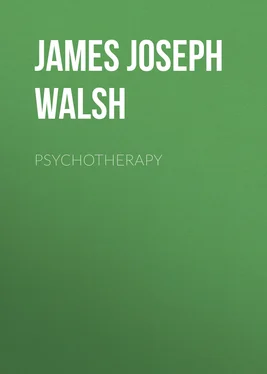James Walsh - Psychotherapy
Здесь есть возможность читать онлайн «James Walsh - Psychotherapy» — ознакомительный отрывок электронной книги совершенно бесплатно, а после прочтения отрывка купить полную версию. В некоторых случаях можно слушать аудио, скачать через торрент в формате fb2 и присутствует краткое содержание. Жанр: foreign_prose, psy_theraphy, foreign_edu, foreign_antique, на английском языке. Описание произведения, (предисловие) а так же отзывы посетителей доступны на портале библиотеки ЛибКат.
- Название:Psychotherapy
- Автор:
- Жанр:
- Год:неизвестен
- ISBN:нет данных
- Рейтинг книги:4 / 5. Голосов: 1
-
Избранное:Добавить в избранное
- Отзывы:
-
Ваша оценка:
- 80
- 1
- 2
- 3
- 4
- 5
Psychotherapy: краткое содержание, описание и аннотация
Предлагаем к чтению аннотацию, описание, краткое содержание или предисловие (зависит от того, что написал сам автор книги «Psychotherapy»). Если вы не нашли необходимую информацию о книге — напишите в комментариях, мы постараемся отыскать её.
Psychotherapy — читать онлайн ознакомительный отрывок
Ниже представлен текст книги, разбитый по страницам. Система сохранения места последней прочитанной страницы, позволяет с удобством читать онлайн бесплатно книгу «Psychotherapy», без необходимости каждый раз заново искать на чём Вы остановились. Поставьте закладку, и сможете в любой момент перейти на страницу, на которой закончили чтение.
Интервал:
Закладка:
In recent years we have come to study much more closely this suggestive element and to appreciate better its true value. Suggestion has always been an important factor in therapeutics, but has been used indeliberately and indirectly rather than with careful forethought. Not that the great thinkers in medicine have not known its value and have not used it deliberately on appropriate occasions, but that the profession generally has been so much occupied with the merely material means of curing that practitioners have not realized the influence for good of the psychotherapeutic factors they were unconsciously employing.
The history of the phases of psychotherapy brings out clearly how much it has always meant in the curing of human ills.
Constancy of Psychotherapy in Medicine.—Though we are prone to think of it as coming to attention in our time, psychotherapy has played an important role in every phase of the history of medicine. It has always been at work, though usually under other names, and has been effectively used without conscious direction. Germs and their pernicious activity were not recognized before our time, yet many definite precautions against them, such as cooking of food and the keeping of perishable goods on ice, which now seem to be the direct result of our knowledge of bacteriology, were commonly practiced. The influence of the mind on the body exerted itself quite apart from man's recognition of its place or appreciation of its power. When employed unconsciously it was in many ways even more effective than it will be when a consciousness of the means by which it is applied becomes more general. For most people are unwilling to confess that their minds exercise as much influence as now proves to be the case, and that over-solicitude means so much in inhibiting the curative powers of nature, and that it is this which is favorably affected by psychotherapy.
The great physicians employed psychotherapy very commonly, and on that account many of their disciples were inclined to think that they were neglectful of medication and other remedial measures. At all times physicians have had to be large-minded and have had to recognize the limitations of medicine in their own time, to turn to other agents and to appreciate how much their own influence on the patient and that of the patient on himself meant for the relief of symptoms and the increase of resistive vitality.
Some of the phases of indeliberate psychotherapy, however, are even more interesting than this chapter of the history of genuine and deliberate psycho-therapeutics. Not a few of the remedies recommended, even by distinguished physicians, were utterly inert, yet accomplished good through their effect upon the patient's mind. If we were to omit all reference to certain favorite prescriptions that passed down from generation to generation, sometimes for centuries, yet eventually proved to be quite inefficient for the purpose for which they were employed, what a large lacuna would be left in the history of medical treatment! Galen's theriac is a typical example of this. Still more strikingly the role of psychotherapy is seen in the many remedies that were recommended at various times for such self-limited diseases as erysipelas, ordinary coughs and colds, pneumonia and typhoid fever. Anything that was administered just before the change for the better came in these diseases, or that was persistently taken until that change came, was proclaimed as curative.
An even more interesting chapter in the positive history of psychotherapy is that which shows how the value of genuine remedies was exaggerated by suggestion, and how these remedies became therapeutic fads, and sometimes almost seemed to be cure-alls. What a large place antimony holds in medical history, though it is now entirely discredited! How beneficent has venesection seemed, though it is now frankly confessed that it has but a narrow usefulness for a very circumscribed set of ills! Calomel in large doses has a history very like that of antimony. Alcohol in various forms, now so strikingly losing its hold in therapeutics, must also be placed in this category.
Psychotherapy has perhaps had its most fruitful field of potency in connection with discoveries in the physical sciences. Whenever a discovery has been made in any science, an application of it to medicine has been mooted by some fertile mind, though as a rule it eventually proved to have no place in medicine. One might ordinarily expect that the suggestion would be latent only when the discovery was in one of the sciences allied to medicine, but this relation has not been necessary. Discoveries in astronomy even, in light, in electricity, in every department of physical science, have each been given their opportunity to affect patients' minds favorably, and have succeeded.
Irregular Phases of Psychotherapy.—The quack has always been a psycho-therapeutist par excellence . His main stock in trade has been his knowledge of men and his power to convince them that he was able to do them good, so that he could tap all the sources of energy that were in the patient, some of them quite latent, yet of great efficiency. Often what the quack and the nostrum vender did for their patients was calculated to do harm rather than good, yet the mental energy aroused by the appeal to the patients' minds was sufficient not only to neutralize the evil, but to release curative powers that otherwise would not have been called out. The advertisements of the nostrum maker have proved especially effective, and printer's ink, properly administered, has been a most potent remedy.
Drug Therapeutics.—Many of the newer phases of mental healing pretend to do away with drugs. Nothing is farther from my purpose than to condemn drugs: I am simply pointing out how much supposed drug efficacy has been due to the mental influence on the patient of the suggestion that went with the drugs. There has been no thought at all of pushing drugs out of the extremely valuable place they occupy in medicine, for I yield to no one in my thorough conviction of their usefulness. But the efficacious element in the administration of many drugs has been entirely the confidence of the physician in them, which confidence was communicated to the patient's mind. Undoubtedly many highly recommended drugs have in themselves tended to do harm rather than good, and have been useful only because of this psycho-therapeutic element. Dr. Oliver Wendell Holmes' famous expression, that if all the drugs that had ever been used had been thrown into the sea instead of put into patients' bodies the human race might have been the better for it, should not be taken to mean that a great many drugs are not efficacious. Above all, it leaves out the most important consideration, that patients, while taking drugs that are either inert or at times even slightly harmful, have had their mental attitude towards themselves and their ills so favorably modified by the repeated suggestion that the result has been distinctly beneficial.
There are probably two score of drugs that are simply invaluable—magnificent auxiliaries in times of physical and mental distress. To realize and appreciate the place of these drugs, their limitations, how they should be administered, and what they can do under varying circumstances, has taken us centuries. When to these drugs there is intelligently attached the influence that psychotherapy has over the patient, their efficacy is probably doubled. Without that influence nature often works against the drug and lowers its efficiency. That is the reason why physicians, when themselves patients, do not respond well to drugs. Familiarity has bred contempt for some of the old-fashioned remedies, but the contempt that comes from familiarity is often quite undeserved, and many of the things that we thus undervalue because of accustomedness have a power that should be respected. People in a dynamite factory become so familiar with danger as to despise it at times, but that does not lessen the energy of the dynamite when occasion arises. When the physician himself is ill he is likely to remember his failures with drugs rather than his successes. That is, however, only the tendency of human nature to a certain pessimistic outlook where we ourselves are concerned.
Читать дальшеИнтервал:
Закладка:
Похожие книги на «Psychotherapy»
Представляем Вашему вниманию похожие книги на «Psychotherapy» списком для выбора. Мы отобрали схожую по названию и смыслу литературу в надежде предоставить читателям больше вариантов отыскать новые, интересные, ещё непрочитанные произведения.
Обсуждение, отзывы о книге «Psychotherapy» и просто собственные мнения читателей. Оставьте ваши комментарии, напишите, что Вы думаете о произведении, его смысле или главных героях. Укажите что конкретно понравилось, а что нет, и почему Вы так считаете.












